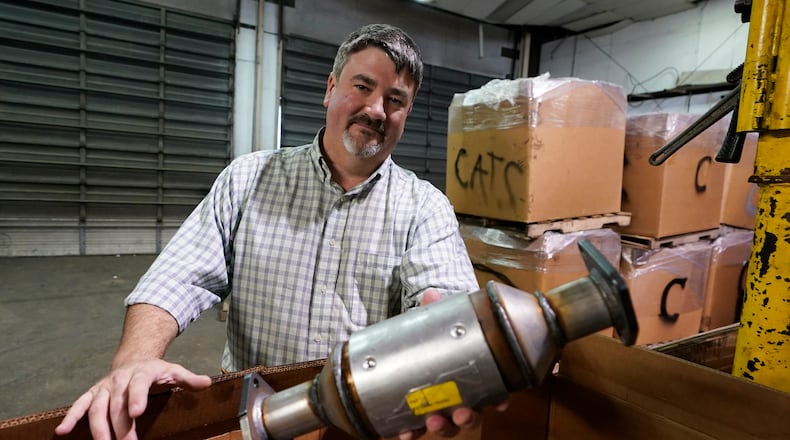Once the converters are stolen, vehicles can be out of commission for weeks. Repairs can cost $933 to $4,414, according to Consumer Affairs.
“We must work to help the countless number of Ohioans who have been victimized by this crime,” Young said in a statement.
Rep. Phil Plummer, R-Dayton, thinks the measure would push back on thefts. He said in an interview Monday that while he isn’t certain why the earlier version of the bill didn’t pass in the last General Assembly, he believes it has a shot in this one.
“We’ll be more aggressive with it, said Plummer, a former Montgomery County sheriff.
“We have to do something about it,” he added.
“I know I fully support and have been pushing for the catalytic converter (legislation) as has Phil (Plummer),” Rep. Andrea White, R-Kettering, said in a text message. “I’m sure the rest of the representatives would also support it.”
The new proposal makes several changes to the earlier version.
- Expanding the Department of Public Safety’s (DPS) authority to go after unlicensed scrap yards and other “bad actor” businesses.
- Requiring DPS to “ensure” that local law enforcement is investigating catalytic converter thefts under certain circumstances.
- Adding a trigger provision if Congress requires vehicles to have a vehicle identification number.
- Specifying the proof of ownership required for buying a catalytic converter.
“Unfortunately, catalytic converters are easy to steal, and they contain rhodium which is a precious metal sold to scrap recyclers for significant dollars,” Roemer said in a statement. “With the right tools, many criminals can commit this crime in less than 60 seconds which impacts many Ohioans.”
Questions about the bill were sent to Young’s office Monday. Jay Carey, a spokesman for the Department of Public Safety, said the department does not comment on pending legislation.
“These thieves have cost us thousands of dollars,” Tracey Tomme, president and chief executive of the Dayton Society of Natural History, the parent organization of the Boonshoft Museum of Discovery, told the Dayton Daily News last July, after the museum had seen multiple vehicles damaged by thieves.
Last September, six people were arrested in connection with the thefts of thousands of catalytic converters in Franklin County and central Ohio, the Columbus Dispatch reported at the time.
Groveport police Chief Casey Adams said an investigation found that as many as 13,000 of the devices had been stolen in 14 months, causing an estimated $19 million in losses or about $1,500 per converter, the newspaper reported.
Two months later, the U.S. Department of Justice said 21 individuals in several states had been arrested or charged for alleged roles in what the department said was a conspiracy to sell stolen catalytic converters to a metal refinery for tens of millions of dollars.
Arrests, searchers and seizures happened in California, Oklahoma, Wyoming, Minnesota, New Jersey, New York, Nevada, North Carolina and Virginia, the federal department said.
A catalytic converter is part of the exhaust system on the undercarriage of a vehicle. It converts engine gases into less-toxic pollutants. Thieves target them because they contain precious metals and can be resold.
About the Author

